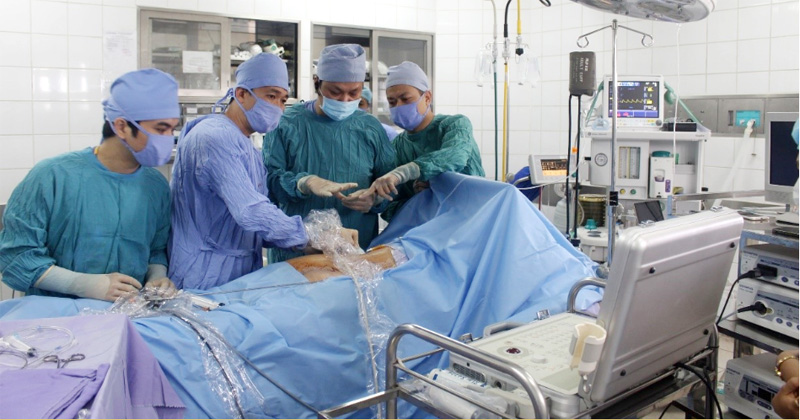
(HBO) - From the beginning of July 2018, the Hoa Binh General Hospital has received over 700 patients per day, much higher than 400-500 patients previously. This shows the hospital is regaining people’s trust after the medical incident at its kidney dialysis division in 2017.
Towards the goal
of becoming a complete first-class general hospital by 2020, the hospital will
firstly build itself into a green, clean and beautiful medical establishment.
It will focus on improving the quality of services, towards public health care
and meeting patents’ satisfaction.
Among its nearly 700 staff and medical workers, there are the three PhDs, two post-graduates,
nine masters, 20 second-level specialists; 49 first-level specialists; and 84
doctors.
The hospital has provided 13,061 techniques, including 11,278 provincial-level
and 1,783 central-level ones.
Many surgical
procedures applied in central-level hospitals have been successfully implemented
in the hospital, contributing to reducing treatment costs for people.
The hospital has also performed complicated surgical techniques such as brain tumor surgery; colorectal
surgery through endoscopy; cataract surgery by phacoemulsification; hemodialysis,
plasma replacement and chemotherapy.
The gene screening test of thalasemia and the neonatal screening test for
detecting congenital hypothyroidism are also conducted in the hospital. From June 2018, the hospital has provided the treatment
service for children with autism in the Pediatrics ward.

The surgical kidneystone removal through
the skin is performed in the hospital
Apart from the professional work, the
hospital has also stepped up humanitarian activities. In the first six months
of 2018, the hospital and charitable organizations provided nearly 63 million
VND in cash and items for 174 poor patients, and gave porridge valued at 104
million VND to inpatients./.
More than just an information technology teacher, Bui Van Nien is an inspiring figure who has nurtured the scientific curiosity and creative spirit of students in Vietnam’s ethnic minority communities.
Da Bac is the most disadvantaged mountainous district in Hoa Binh province, with ethnic minorities accounting for about 90% of its population. Over the past years, the district has mobilised resources to implement ethnic policies to improve the quality of life of local people.
In recent years, Hoa Binh province has consistently prioritised the protection, care, and education of children, particularly those from ethnic minorities and disadvantaged backgrounds, by creating a safe, healthy, and nurturing environment for their all-round development.
The Steering Committee for Tobacco Harm Prevention and Control of Hoa Binh province, in coordination with the Tobacco Harm Prevention and Control Fund, held a ceremony on May 28 in response to the World No Tobacco Day (May 31) and the National No Tobacco Week (from May 25 to 31). The event was chaired by Nguyen Van Toan, Standing Vice Chairman of the provincial People’s Committee and head of the Steering Committee.
Since 2021, the Center for Industrial Promotion and Industrial Development Consulting (CIIDC) under the Department of Industry and Trade has been implementing a school lighting model as part of the plan for using energy efficiently and economically in Hoa Binh Province in the pẻiod of 2021 - 2025. This model not only aims to improve the learning conditions and enhance the education quality, but it also promotes the message of energy saving, energy security, environmental protection and contributes to the goals of socio-economic development.
In the 2024 - 2025 school year, the entire Hoa Binh provincial education sector includes 520 educational institutions and schools. Among them are 13 ethnic boarding schools with 153 classes and 4,487 students. Four of these schools have met national standards, reaching 30.7 percent.



